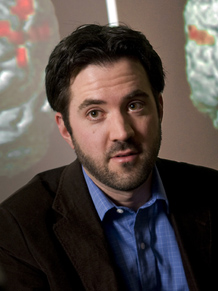How does memory fail–and succeed?
Senior moments are typically associated with, well, seniors.
In fact, recent studies have shown that although elderly people are prone to memory lapses when it comes to words and numbers they are actually as good as undergraduate students at recalling easier-to-remember visual images. This distinction could provide clues about how aging affects memory.
David Gallo, PhD, Assistant Professor of Psychology, is conducting novel experiments to determine which regions of the brain are engaged in recalling words and images for both college students and people over 65 years old. To map these brain patterns, the researchers are using functional MRI (fMRI), a relatively new imaging modality that can track the brain’s neural activity by measuring blood flow and oxygenation levels.
“These experiments will advance our understanding of how memory works and how aging compromises it,” Gallo says. “They could also lay the foundation for future studies that could identify markers of age-related diseases, including Alzheimer’s.”
Gallo’s work is supported by a two-year National Institute on Aging $127,920 grant that has allowed the hiring of one full-time research assistant and several summer interns.
Compensating for memory loss
In Gallo’s experiment, dozens of healthy seniors and college students will try to memorize a series of words and images. Shortly afterward, their ability to recall these words and images will be tested while the subjects are undergoing fMRI at the University of Chicago Medical Center. The fMRI will map brain patterns and determine which regions of the brain are engaged in recalling the studied information.
Specifically, the experiments will measure how much seniors and college students involve the prefrontal cortex in remembering words and images. The prefrontal cortex is critical for cognitive control, such as using different strategies to retrieve events from memory. Previous work indicates that seniors activate some regions of prefrontal cortex more than college students when performing memory tasks, while other regions are less active in seniors. The critical question is why.
One prevailing theory holds that this increased prefrontal activity reflects diminished cognitive control in seniors, potentially undermining the ability to retrieve information from memory. In this case, the unusual patterns of prefrontal activity in seniors may be the cause of their memory impairments. An alternative theory holds that these prefrontal changes represent attempts to strategically compensate for memory deficits. According to this theory, elevated prefrontal activity in seniors can be a good thing—helping them retrieve memories that otherwise would be unavailable.
“You can’t determine whether a given pattern of brain activity is the cause or the effect of memory problems unless you use the fMRI in conjunction with a well-controlled psychology experiment,” Gallo says.
Gallo’s work will determine which of these two theories of brain function in aging is correct. If seniors show unusual patterns of prefrontal cortex compared to students—but equally for words and images—it would indicate that engaging the prefrontal cortex for memory is a normal part of aging. If, on the other hand, seniors activate their prefrontal cortex more when recalling harder-to-remember words than easier-to-remember images, it would indicate that engaging the prefrontal cortex is a way to compensate for diminished memory power. Seniors might strategically engage prefrontal cortex, but only when confronted with a challenging memory task that requires additional effort.
“Our results will be especially telling when combined with converging evidence from memory studies in stroke patients, whose prefrontal cortex is compromised, and in teenagers, whose prefrontal cortex is still developing,” Gallo says.
Gallo also will be looking for strategies that elders could employ to improve their memory or compensate for certain types of memory loss. “Such strategies could be developed into cognitive exercises to enhance memory accuracy,” he says. In this case Gallo’s findings would be welcome, as we could all do with fewer senior moments!
by Greg Borzo
This award is funded under the American Recovery and Reinvestment Act of 2009, NIH Award number: 1R03AG032417-01. For more information on NIH’s Recovery Act projects, visit http://recovery.nih.gov/.

David Gallo, PhD, Assistant Professor, Department of Psychology, received $127,920 in ARRA funding from the National Institute on Aging to study how aging affects different memory processes and develop diagnostic tools and interventions that might help improve quality of life. (Photo by Lloyd DeGrane.)










